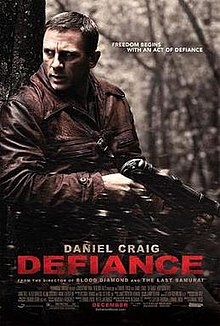
I recently finished reading Defiance, by Nachama Tec. A true story, Defiance relates how a Jewish man, Tuvia Bielski who, along with his brothers Asael and Zus, saved over 1200 Jews from being murdered by the Nazis when they occupied Belorussia during the Second World War. It was also made into a movie starring Daniel Craig.
The Bielski brothers were not educated people, but they understood life better than most intellectuals. In particular, Tuvia made it his life ambition to rescue as many Jews as he could and to do so by killing as few opponents as possible. Moreover, once he had rescued them, he organized them into a community, the Bielski Otriad, in the forests (Nalibocka) of eastern Belorussia. In order to evade prowling Nazis, the Bielskis realized they'd need to base their community in the forest, and a swampy portion of the forest at that. For two years, this community of Jews lived outside, dealing with the vicissitudes of the weather in eastern Europe. Life wasn't always easy. At times it was extraordinarily difficult. Yet because of Tuvia's capable leadership, most people survived.
Tuvia's leadership was one that fused strict adherence to the rules of the camp with applying the utmost fairness in decision making. He had to make some hard choices. But he also made some highly gracious ones. Yet in many ways, Tuvia's approach mirrors how many of us might wish for a God to be: highly moral but entirely fair. Though Tuvia was far from perfect, his persistence in following this approach succeeded in sustaining the camp through its two years in the forest.
Moral and fair seem to countermand each other. Set into transcendence, however, they fit perfectly.
No comments:
Post a Comment